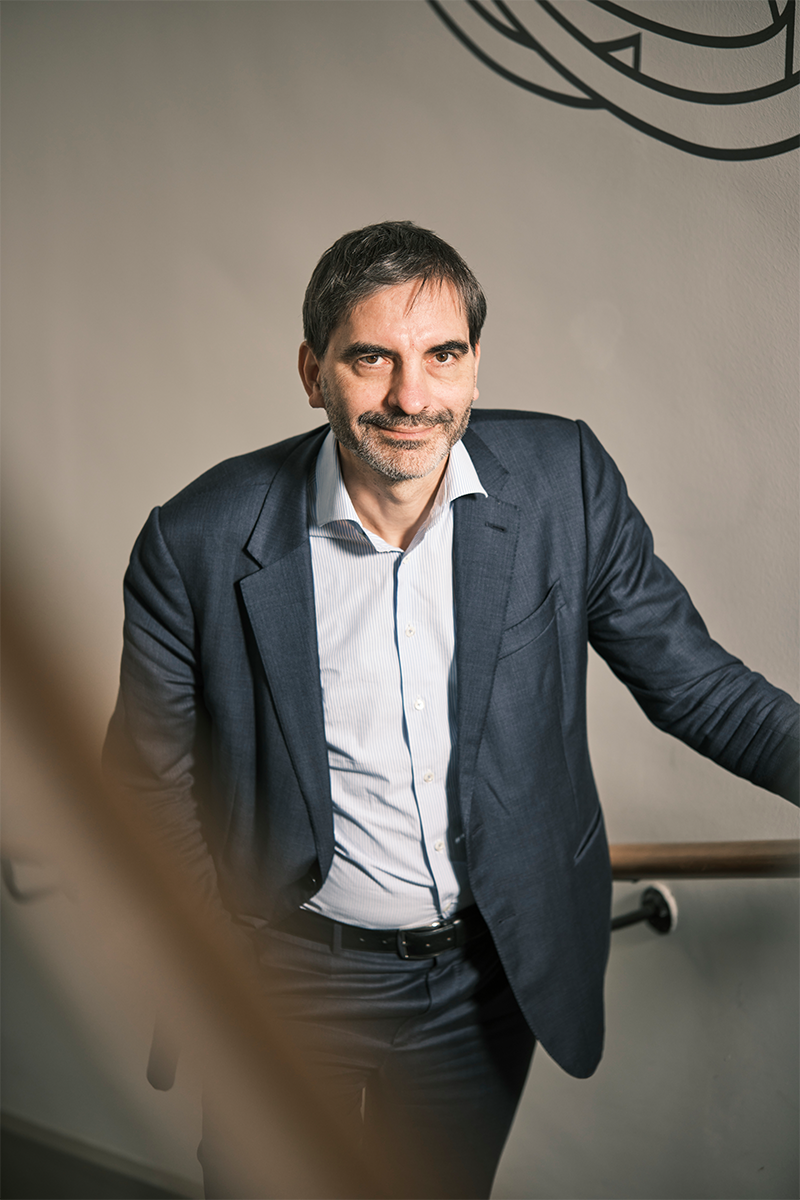Economics
“Switzerland doesn’t need a big bank”
Economics cannot predict bank crashes or crises, says Professor of Economics Aymo Brunetti. But their insights would help us to mitigate the adverse effects of financial crises and fight inflation.

Aymo Brunetti: I cannot judge what role Thiam played in the demise of the CS. Irrespective of this, however, I can say that running a company is something completely different from being a political leader. The people at the top usually don’t have to know details, but instead make strategic decisions. In politics, on the other hand, those responsible have to know the dossiers in detail, you cannot make decisions alone and you have to consider a large number of voices in order to achieve what is feasible. It is therefore virtually impossible to predict the qualities of a possible Thiam presidency.
Heads of African states often regard the state as a self-service store. From 2015 to 2019, Thiam earned CHF 62 million in bonuses from CS. Wasn’t that a kind of self-service?It was all legal. Private companies can pay as many bonuses as they want. It only becomes a problem when they claim state aid for security.
“Unless the climate problem is alleviated, growth will not automatically lead to greater prosperity.”
Aymo Brunetti
The merger of the major banks a year ago required state liquidity support. You are convinced that the Too-big-to-fail rules, or TBTF rules for short, could have been applied instead. These envisage letting international business go bankrupt and saving domestic business. Why should that be practicable?In March 2023, under time pressure, a decision was made against the settlement because the risks were considered too high. However, this is not proof that the TBTF rules do not work. Since then, several reports have identified gaps in the resolution regime, but have confirmed the feasibility of the rules. For me, that is the starting point. Any liquidation of UBS would have to be watertight without government support. As UBS is the last remaining major Swiss bank, nationalization would be the only alternative next time. The latter would mean that the state would take over a major dysfunctional bank and bear a risk of hundreds of billions of francs. That would be unacceptable.
UBS CEO Sergio Ermotti is already threatening to leave in the event of stricter regulations. How serious is this to be taken?I’m not particularly impressed by that. People are always saying that we have multinational companies, so we need a global bank. That is an absurd argument. In Switzerland, practically everyone drives a car, even though we do not produce any cars. Switzerland doesn’t need a big bank. If UBS moves away, we will have to forego around half a billion Swiss francs in income tax per year. But we would no longer have the big risk on our hands. Incidentally, UBS bank customers in Switzerland would hardly notice any of this, as the Swiss business would remain attractive for the bank. Nevertheless, it would of course be far better for UBS to remain based in Switzerland – if it really could be wound up without state aid.
Where do you see the gaps in the TBTF concept that you mentioned?The primary aim is to prevent a bank storm during settlement, as this would make the bank illiquid in a very short time. It is now known that this requires a public liquidity backstop (PLB), a form of state-guaranteed liquidity support.
Subscribe to the uniAKTUELL newsletter

Discover stories about the research at the University of Bern and the people behind it.
It is true that taxpayers are ultimately responsible for the PLB. This is in the unlikely event that the collateral deposited by the bank is insufficient for liquidity. Ultimately, the PLB is like insurance for an extreme case. But what is crucial is that UBS has to pay an adequate premium for this insurance. We are currently talking about a few million francs. In my opinion, that is far too little. We need a substantial, risk-adjusted premium payment every year. If this is not the case, we will in fact have a state guarantee again.
How much does the premium have to be?I’m not going to give figures. Ultimately, the premium depends on the bank’s risk behavior with regard to liquidity. This is the case with every other insurance company and provides the right incentives.
Nobody saw the CS decline coming – the same was true of the 2008 financial crisis. What good is the economy if it does not foresee crises?It would be unrealistic to expect such forecasts from the economy. It is impossible to accurately predict a crisis. An economy is very complex and there is little data which arrives with a delay anyway. It is easier to forecast the weather than the economy. We can look out of the window to see what the weather is like. We won’t know what the current economic situation is like until two or three months from now, when the relevant data is available. Forecasting crisis-like slumps is even more difficult.
So what can economics actually do?When the crisis comes, we know what to do thanks to the economic analysis of previous crises. There are many parallels between the financial crisis of 2008 and the Great Depression of 1929. Without the lessons learned for economic policy from the Great Depression, the 2008 financial crisis would have led to years of economic crisis. For example, we knew that we had to cut interest rates and expand the money supply to fight this crisis. A well-developed unemployment insurance scheme was also important. Lessons have been learned from the past. In this respect, economics is valuable.
About the person

Aymo Brunetti
has been Professor of Economics at the University of Bern since 2012. Prior to this, he held senior positions in the State Secretariat for Economic Affairs (SECO). Brunetti continues to advise the Confederation from time to time. In 2009/2010, as a member of an expert commission, he developed solutions to mitigate the “too big to fail” problem.
The last major inflation was in the 1970s, so it was a long time ago. Younger economists hardly considered it a problem anymore. When it comes to combating this problem, it is important to take account of the experience gained at that time. For example, the pressure to cut interest rates again is mounting. If you give in too quickly, the same thing could happen as back then in the United States. Inflation rose to such an extent that the US Federal Reserve had to resort to a sledgehammer with interest rates of 20%. Although this fought inflation, it triggered a severe recession.
There is currently growing unease about economic growth. What does the economist say about that?Virtually all arguments against economic growth are easy to refute. For example: If I offer you 10,000 francs, you will probably take it. And that’s true of most people. Everyone seems to appreciate more prosperity. People are just the way they are. However, there is one problem that growth can undoubtedly bring with it.
What are you referring to?Unless the climate problem is solved, growth will not automatically lead to greater prosperity. In transport, for example, the external costs to the environment are not taken into account in gasoline prices. We economists strongly recommend that environmental damage be taken into account in gasoline prices. That is why a corresponding incentive tax would be absolutely crucial. Ultimately, in political reality, environmental protection depends on growth. In a shrinking economy, no one will want to pay for environmental costs.
How expensive would a liter of gasoline have to be?It is difficult to say precisely. However, doubling the price would have a tremendous incentive effect.

The correct incentive tax works by returning the additional revenue from the increase in gasoline prices per capita to the population. The best option would be a refund – visibly – by check. Poorer families in particular could benefit the most because they often use less gasoline. They would receive thousands of francs net every year from the proceeds of the incentive tax. Politically, this is much more attractive than simply increasing the price of fuel.
Subsidizing alternative energies seems more politically feasible at the moment. What do you think?This is a much less efficient solution. In the market economy, scarcity is expressed through prices, which leads to an efficient use of scarce resources. That is the advantage of the incentive tax.
Switzerland often comes out of crises more unscathed than its neighboring countries. What makes Switzerland so resilient?Things were very different back in the 1990s: There was a no vote to the EEA, a real estate crisis and an appreciation of the Swiss franc. This led to prolonged near-zero growth and an increase in unemployment to over five per cent. This has changed over the past 20 years. The shock of the 1990s contributed to economic policy reforms that have made us more resilient. The introduction of the debt brake, for example, was the absolutely decisive point. But the bilateral agreements with the EU were also very important for gaining market access to Europe. In addition, Switzerland now has a highly diversified export economy. You tend to only think of the multinationals. But Switzerland has relatively small companies that are global market leaders in many sectors.
Magazine uniFOKUS

"Disruptions"
This article first appeared in uniFOKUS, the University of Bern print magazine. Four times a year, uniFOKUS focuses on one specialist area from different points of view. Current focus topic: "Disruptions"
More articles from this issue Subscribe to uniFOKUS magazineThe free movement of people is an outstanding success story from an economic point of view. During the financial crisis, Switzerland was one of the few countries in which demand from migration prevented consumption and construction from plunging into recession. There used to be a pure quota system. As a result, less-well-educated people migrated to the politically strong but economically weaker sectors such as agriculture and construction. Since the free movement of people, companies have been able to hire qualified people directly where there is a shortage. This has massively strengthened Switzerland’s resilience.
And is being questioned by the biggest party.Of course. None of this is God-given.
How important is the low-tax policy?A sensible tax system is one of the basic conditions. However, it is not the decisive factor in the relocation of companies.
But it does provide an incentive: According to a study by US researcher Gabriel Zucman from Berkley University, 40% of global corporate profits are shifted to tax havens such as Switzerland.With the OECD tax reform and the corresponding increase in corporate taxes in Switzerland, such an argument has now become obsolete. Switzerland is certainly not primarily successful because it takes tax resources away from others. By lifting banking secrecy for persons from abroad, Switzerland now complies with international agreements; this also applies to money laundering.
Which brings us back to Mr. Thiam: He will probably invest any assets he may have from the Ivory Coast in Switzerland.I don’t want to insinuate anything about Mr. Thiam. I imagine he’s going to be a good president. But yes, strict implementation of international requirements in these areas is very important for Switzerland. Due to our history and our position as a globally successful business location, we will always be in the shop window as it were.